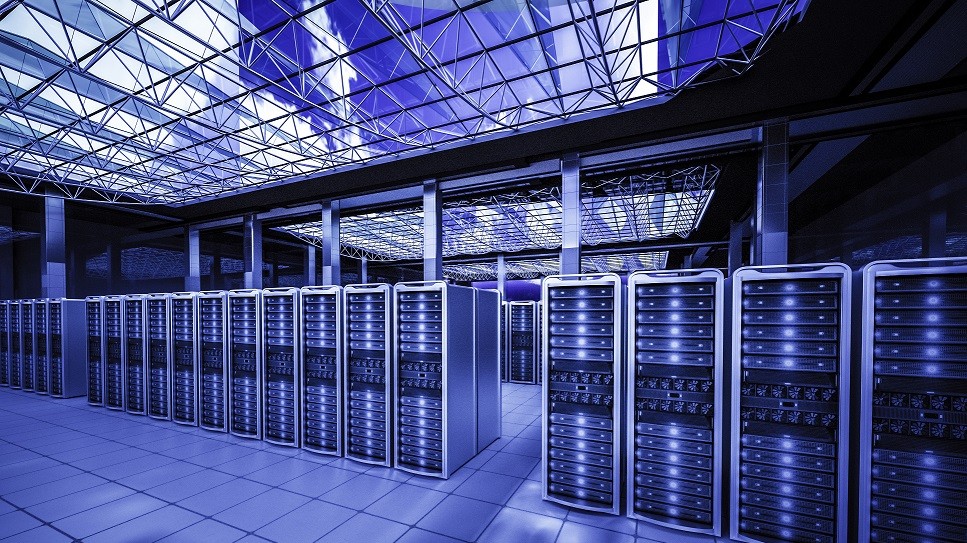Digital Infrastructure is Fundamental to Economic Growth in Europe - doteditorial
Dr. Béla Waldhauser from the eco Association looks at the digital infrastructure requirements for Europe to remain competitive in the global digital economy

© v_alex | istockphoto.com
Digital infrastructure providers remain the unsung heroes of economic growth in the modern world. Digital infrastructure is the nucleus for industry as a whole, forming the foundation for the higher layers in all value chains, more and more so as industry undergoes digital transformation. Without high-speed networks and highly secure, available, and reliable data centers, there can be no digitalization – for companies of any size.
Europe is facing a significant challenge in competing internationally with the strongly growing digital regions of the Asia-Pacific and the USA. Strengthening digital infrastructure will offer Europe the chance to be a flourishing digital economy, tied in with the opportunities to optimize manufacturing, improve service provision, and increase employment. But to achieve this, there needs to be a simplification of possibility for investment in digital infrastructure – from the construction of data centers to the rollout of broadband networks – and a simplification of approval processes; there need to be innovation-friendly framework conditions; and there needs to be a concerted effort to train and educate existing and future personnel to exploit to the fullest the economic potential that digital infrastructures represent.
Alliance for the Strengthening of Digital Infrastructures
To raise awareness for the economic importance of digital infrastructure in Germany, the eco Association established the Alliance for the Strengthening of Digital Infrastructures in Germany in 2018. While some of the demands are specifically focused on the German situation, most of them are applicable across Europe.
Political demands for digital infrastructures within Europe:
- Recognize digital infrastructures as an important factor for Europe as an industry location
- Drive forward broadband expansion
- Strategically strengthen and develop Europe as a data center location
- Develop measures that take diverse business models into account
- Fund research in the data center area
- Reduce bureaucracy; develop leaner and more efficient administration processes
- Fund training and further education
- Implement strategies at the EU level
The importance of investing in digital infrastructure
Digital infrastructure needs are constantly increasing, in line with the explosion in digital innovation. Christoph Dietzel from DE-CIX offers insight into how the Internet itself will transform in the coming years, in his article “The Internet of the Future – What Happens Behind the Scenes?”.
Companies that want to digitalize their core business or make use of digital services have no option but to invest in IT infrastructure. They can achieve this in multiple ways – through making use of cloud-based services, outsourcing to a colocation provider, or building their own data centers. This is a topic covered from various points of view in this issue of dotmagazine. The strategic “make or buy” decision for different kinds of companies is a subject raised by Laurent Tognazzi from Siemens in his interview “Data Centers are Here to Stay – We Won’t Stop Using Data”. Lauren Fahey and Tony Robinson from Corning take the perspective that many companies can benefit from the “buy” side of this strategy, by outsourcing their IT infrastructure needs to a colocation – or multi-tenant – data center (“Multi-Tenant Data Centers: Managing Data for Less”). Taking a different angle, Wolfgang Kaufmann from Datacenter One argues that enterprises can have the best of both worlds, by combining the advantages of ownership and outsourcing to achieve business goals (“Colocation: Make or Buy? What is Worthwhile, and for Whom?”).
There are data centers of all shapes and sizes to meet the needs of companies that are already digital, through to those that are struggling to find their way through the maze of digital transformation.
But it’s not only the private sector that should be investing. The European Commission’s proposals for the European financial framework 2021–2027, published in late 2018, foresee an increase in spending on digital transformation and digital infrastructure, but the Deutsche Bank’s EU Monitor on Digital Infrastructure criticizes the fact that, taken together, these two items are allotted only 1% of the total EU budget.
Cities are also called upon to invest in and support the rollout of digital infrastructure, as is exemplified by Björn Schwarze from ADDIX Internet Services in his article “Public WiFi – The Basis for Digital Transformation” and the exploration of the future smart city by Equinix's Dietmar Kessler.
The simple truth is that in Europe, while digital infrastructure investments are growing (in Germany, for example, there was 10% growth in investment in 2016), the region is still falling behind in international comparison. Because elsewhere it’s booming. Especially when we talk about cloud services and the construction of hyperscale data centers, we see that growth in the USA and Asia is significantly stronger than in Europe.
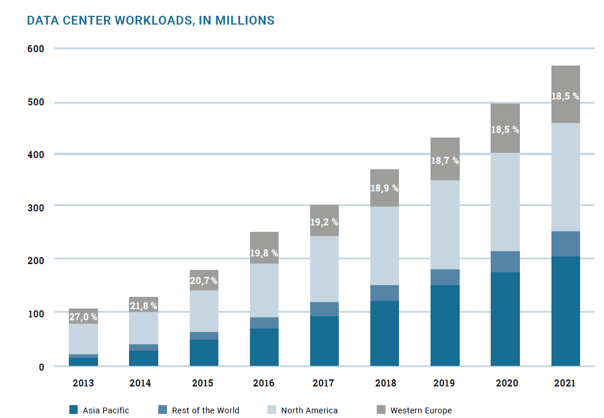
Global distribution of DC workloads Source: Cisco, visualization Borderstep (Cisco, 2014,2015, 2016, 2018)
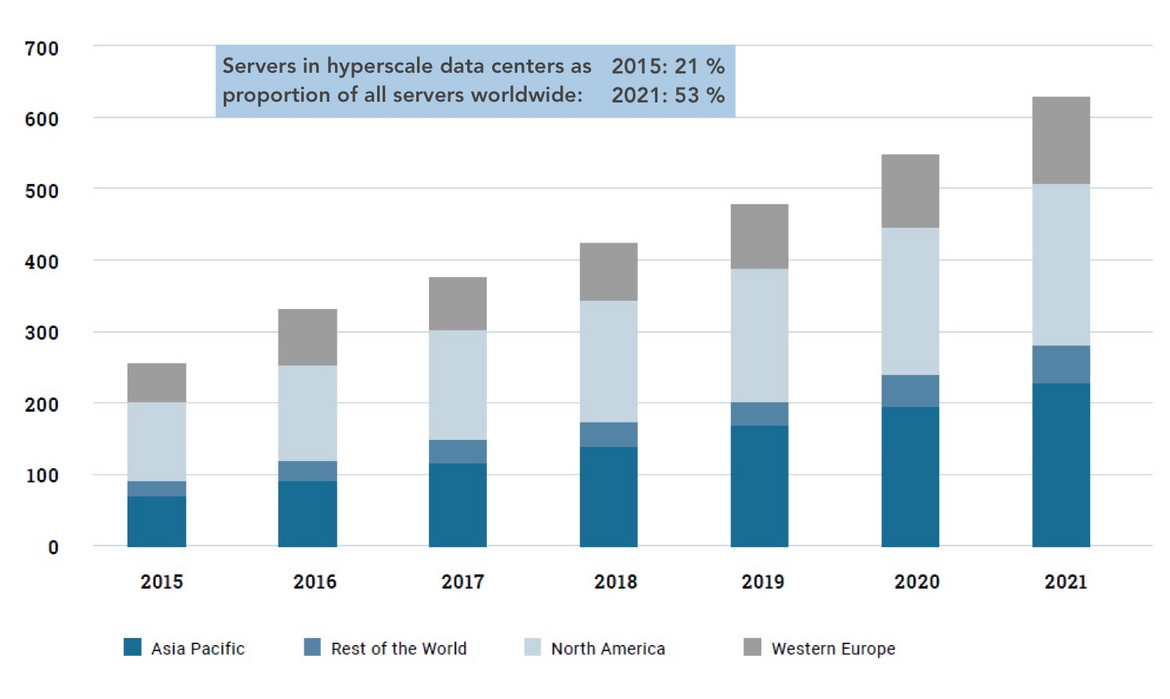
Number of hyperscale data centers worldwide Source: Cisco, visualization Borderstep (Cisco 2016. 2018)
To even maintain Europe’s current standing, there is therefore urgent need for action.
Economic impact of connectivity
Without doubt, investment in broadband connectivity pays off in terms of economic growth. The impact of each additional fiber-optic connection in Austria, for example, results in the contribution of an additional 170,000 Euros to the GDP.
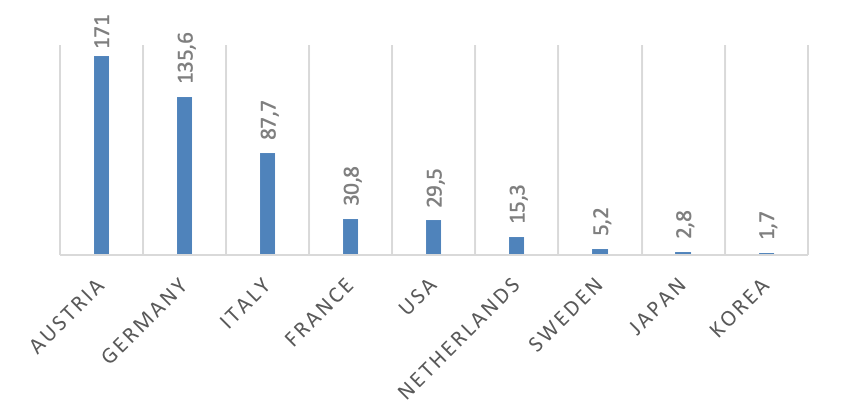
How much GDP growth a single additional fiber-optic connection generates, in selected countries; in 1,000 Euro per connection Sources: European Commission, 2017; ITU, 2017; IW Consult 2018
Gapless broadband rollout – and now also 5G networks – is important to make sure that it’s not only the major metropolitan centers that can benefit from digital transformation. The impact of 5G and the infrastructural investments that will still be needed in order to exploit the technology is a topic in this issue for Klaus Landefeld from the eco Association, independent consultant Gerd Simon, and Wolfram Rinner from GasLINE.
For economies like Germany and Austria, bringing SMEs and regional companies online will have an especially strong impact on the economy. In the – for the German economy – strategically important manufacturing industry, more than half of the companies (53 %) still have a low level of digitalization [1] – and many of these are located in rural areas. But even in countries with centralized industry, connecting rural areas will ensure that no part of the population is excluded from participation in the digital society. As government services, healthcare, and education offers go online, this becomes not only an economic issue, but one of basic access. This is also of significant interest for data centers themselves, given that, as Ivo Ivanov from DE-CIX points out, connectivity has become one of the key differentiators for data centers in an increasingly crowded and competitive marketplace.
Challenges in constructing and operating data centers
An assessment of locational factors for data centers in international comparison offers some interesting insights. Factors such as data protection, power prices, reliability of power supply, level of bureaucracy/approval process, and availability of specialist workers impact how fertile the ground is for the establishment of data centers. According to the Borderstep Institute study into the importance of digital infrastructures to Germany, Germany and the USA provide a case in point here, with an inverse set of conditions for data center operation. While Germany has advantages in the reliability of its power supply and its long-standing data protection regime, the USA offers good power prices, rapid approval processes, and access to specialist workers. None of the European countries assessed by Borderstep can compete with the USA’s approval processes, and in none of the countries is the access to specialist staff considered to be “very good”.
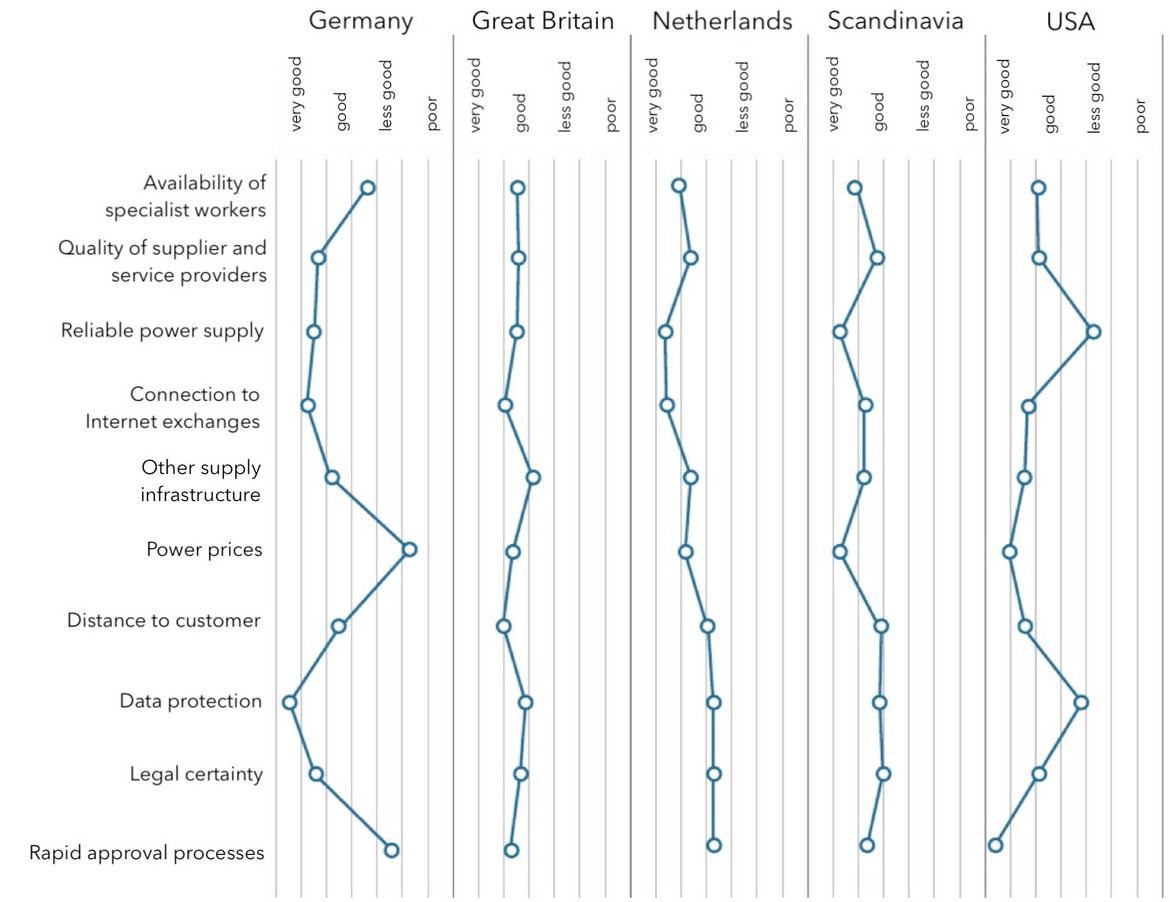
Assessment of locational factors for DCs in international comparison – results of a Delphi survey Source: Borderstep, 2018
Several factors in the design and operation of data centers are picked up on in this issue of dotmagazine. Mathias Loacher from 1&1 IONOS describes a cost-efficient data center design with a focus on distributed electrical redundancy (“A Balanced Data Center Design”). For Toan Nguyen from e-shelter, the focus is on access security in data centers, with a blockchain-based biometric identification solution which also makes access audit-proof. Ulrich Terrahe from dc-ce looks at mastering DC documentation as a whole through digital tools and Virtual Reality. A further point to contend with is the issue of e-waste, and although the data center industry itself has a relatively small impact in this area, David McCall from QTS nonetheless believes data centers can still offer leadership in the area of e-waste best practices.
Core digital skills for the workforce of today and tomorrow
In Europe, there is a strong need for specialist workers in all areas of IT. In Germany alone, there will be the need for an additional 700,000 technical personnel by 2023.
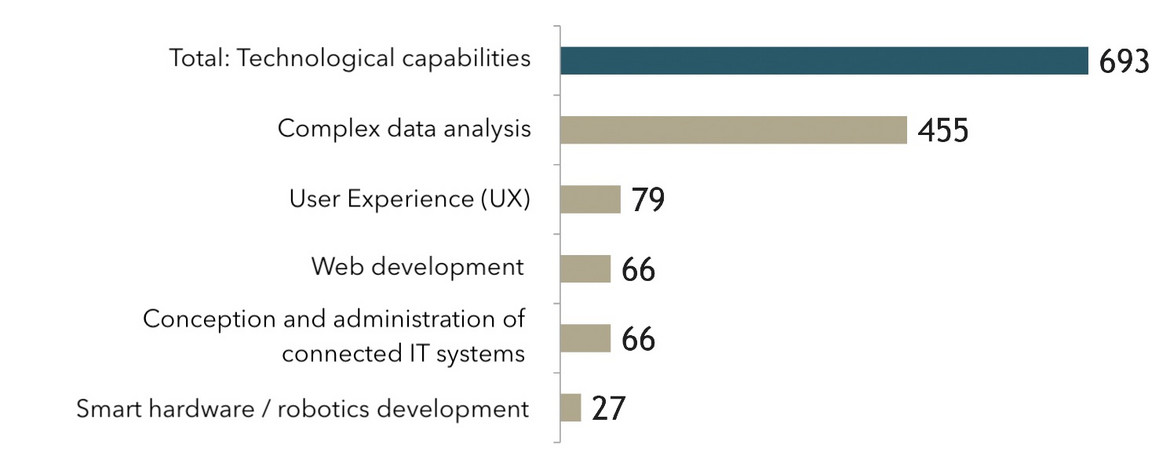
Number of additional people with technical capabilities that will be required in companies in Germany by 2023, in thousands Source: Stifterverband, McKinsey, 2018
This includes people with the engineering and technical knowledge to build and run data centers and other digital infrastructures, but also, for example, the data analysts that can harness the data that can flow through this infrastructure, in order to build the new business models of the digital economy. For every single person employed in the IT infrastructure and hardware development areas, a further six will be required with strong technical capabilities further downstream, as customers of the infrastructure providers. And this is not to mention the many, many more who will reap the benefits of employment growth associated with a flourishing digital economy. But these workers will also need to be trained in core digital skills and keep these up-to-date in a rapidly evolving working environment.
The economic potential of digital transformation is enormous, but it is not possible to take advantage of this without a strong foundation of digital infrastructure.
References
1. Graumann et al., 2017, p. 22 and 24
Theoretical physicist Dr. Béla Waldhauser is Chief Executive Officer of Telehouse Deutschland GmbH and KDDI Deutschland GmbH. Previously he was responsible for the German operations of Global Switch, and prior to that TeleCity. Before this, he was Managing Director for Germany and Austria for Teleglobe. For several years, he has been Leader of the eco Competence Group "Data Center Infrastructure" and since 2011 Member of the Jury for the "German Data Center Prize" in conjunction with the annual "Future Thinking" congress. In 2014, he was invited by the German Federal Ministry of Education and Research, as an expert and as a member of the eco Association, to actively participate in establishing the new strategy platform for “ITC in Horizon 2020”. Dr. Waldhauser is also Spokesperson of the Alliance for Strengthening Digital Infrastructures in Germany, set up in early 2018 under the umbrella of eco to support Germany's development as a digital location.


